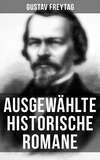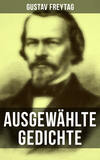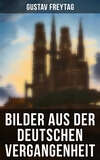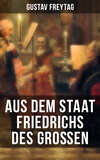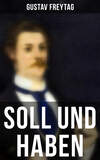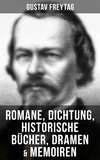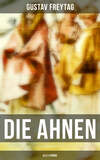Kitabı oku: «The Lost Manuscript: A Novel», sayfa 7
It was, indeed, a violent storm that raged about the old house. Those who listened for the first time in this place, on the open height, alongside the ridge of hills, from which the rolling, tumultuous crash of the thunder resounded, felt that they had never experienced such power in nature before. While the thunder roared, the room suddenly became dark as night, and ever and anon the dismal twilight was pierced by the flash of fiery serpents that swept over the farm.
There was noise in the children's room; the crying of the little ones could be heard. Ilse went to the door and opened it. "Come to me," she called out. The children ran in terrified, and pressed round their sister; the youngest clung to her dress. Ilse took the little child and placed it under the charge of the Professor, who was standing by her side. "Be quiet, and say your prayer softly," she said; "this is no time for weeping and complaining."
Suddenly came a light so blinding that it caused them to close their eyes-and a sharp concussion, ending in a discordant crash. When the Professor opened his eyes, by the light of another flash he saw Ilse standing by his side, her head turned toward him with a radiant look. He exclaimed, anxiously: "That has struck."
"Not in the farmyard," replied the maiden, unmoved.
Again a clap, and again a flash, and a clap, wilder, shorter, sharper. "It is just above us," said Ilse, calmly, pressing the head of her little brother to her as if to protect him.
The Professor could not turn his eyes from the group in the middle of the room. The noble figure of the woman before him, erect, motionless, surrounded by the frightened brothers and sisters, the countenance raised, and a proud smile playing about the mouth. And she, in a moment of uncontrollable feeling, had confided to his care one of the lives that were so dear to her; he stood in the hour of danger near her as one of hers. He firmly held the child, which clasped him in terror. They were short moments, these; but between flash and thunder-clap the spark that glowed in him had blazed out into a bright flame. She who stood near him in the lightning, suffused with the blinding light, she it was who had become necessary to his life.
Still longer did the thunder roar; the heavy rain beat against the window; it clattered and dashed round the house; the windows trembled under the raging outburst of the storm.
"It is over," said Ilse, gently. The children separated and ran to the window. "Up-stairs, Hans!" cried the sister, and hastened with her brother out of the room to see whether the water had made its way in anywhere. The Professor looked thoughtfully toward the door through which she had disappeared; but the Doctor, who meanwhile had been seated quietly on a chair, with his hands on his knees, shaking his head, began: "These freaks of nature are against us. Since lightning conductors have come into discredit, one has not the poor comfort of thinking that the old manuscript has even their protection against the attacks of the weather. This is a bad habitation for our poor old manuscript, and it is verily a Christian duty to rescue the book as quickly as possible from such a dangerous thunder-trap. Shall we be able in the future, with any tranquillity of mind, to look upon a cloud in the heavens? It will remind us of the disasters that may befall this place."
"The house has held out hitherto," answered the Professor, laughing. "Let us leave the manuscript meanwhile to the good Power in whom the people here so firmly trust. The sun's rays are already breaking through the mist."
Half an hour later it was all over; the dark clouds still hovered above the hills, and from the distance resounded the harmless thunder. Life began to stir again in the empty farmyard. First, the ducks came forth with joyous haste from their hiding-place, cleaned their feathers, examined the puddles of water, and quacked along the ruts made by the wheels; then came the cock with his hens, cautiously treading, and picking the soaked seeds; the doves flew on to the projections of the window, wished each other good fortune with friendly nods and spread their feathers in the fresh sunlight. Nero bounded boldly out of the house, trotted through the farmyard, and barked in the air by way of challenge to frighten away the hostile clouds. The maids and laborers again stepped actively about the place, breathing the refreshing balsam of the moist air. The Inspector came and reported that the lightning had struck twice on the neighboring hill. The Proprietor, thoroughly wet through, rode rapidly in, anxious to see whether his house and farm-buildings were undamaged. He sprang gaily from his horse, and exclaimed: "The rain penetrated everything out there. But, God be praised, it has passed over. We have not had such a storm here for years." The people listened also for awhile as the head ploughman related that he had seen a pillar of water, which hung like a great sack from heaven to earth, and that it had hailed violently on the other side of the border. Then they entered the stable with great equanimity, and enjoyed the hour of rest that the bad weather had brought them. While the Proprietor was talking to his staff, the Doctor prepared to descend, with the boys and the tutor, into the valley, there to see the overflowing brook.
But the Professor and Ilse remained in the orchard, and the former was astonished at the number of snails that now came out everywhere, trailing slowly over the path; and he took one after the other and placed them carefully out of the way, but the senseless creatures always returned again to the firm gravel, expecting that the foot-passengers were to get out of their way. They both examined the fruit trees to see how they had borne the storm. They were much broken, and their branches bent down. Much unripe fruit lay scattered on the grass. The Professor cautiously shook the branches, bending under the weight of the rain, in order to free them from their burden; he fetched some poles to support an old apple tree which was in danger of breaking under the weight, and both laughed heartily when, in the course of his work, the water from the leaves ran in small streams down his hair and coat.
Ilse clasped her hands together, lamenting over the fall of so much fruit; but there was still much on the trees, and they might yet hope for a rich harvest. The Professor sympathized with her and advised her to dry the fallen fruit, and Ilse laughed again at this because most of it was unripe. The Professor confided to her that he as a boy had helped his dear mother when she used to arrange the fruit on the drying-board; for his parents had owned a large garden in the town in which his father was an official. Ilse listened with eager interest when he related further how he had lost his father as a boy, and how lovingly and wisely his mother had cared for him, how confidential his relations with her had been, and that her loss had been the greatest sorrow of his life. Then they walked up and down along the gravel walk, and in both of them an echo of the sorrow of past days intermingled with the cheerful mood of the present; just as in nature the movement of a violent storm leaves after it a gentle trembling, and the pure light of day sparkles on bower and blade like countless glittering precious stones.
Ilse opened a gate which led from the lower part of the orchard into the open country, and standing still, said, hesitatingly: "I propose a walk into the village to see how our Pastor has stood the storm; would you like to make the acquaintance of our dear friend?"
"I shall be delighted to do so," answered the Professor.
They walked along a damp footpath that wound its way through the length of the valley by the side of the churchyard. Near it lay a little village of closely-packed houses, in which dwelt most of the laborers of the estate. The first building below the church was the Pastor's house, with a wooden roof and small windows, differing little from the dwellings of the country people. Ilse opened the door, and an old maid-servant hastened toward her with a familiar greeting.
"Ah, Miss," she exclaimed, "we had bad weather to-day. I thought the day of judgment had surely come. Master stood constantly at the chamber window looking up to the manor and raising his hands in prayer for you. He is at present in the garden."
The guests passed out through the rear door into a small space between the gables and barns of the neighboring farmyards. A few low fruit trees stood along the edges of the flower-beds. The old gentleman, in a dark dressing-gown, stood by an espalier, working industriously.
"My dear child," he cried, looking up, and a smile of pleasure lighted up the kind face under his white hair, "I knew that you would come to-day."
He bowed to the stranger, and, after a few words of greeting, turned again to Ilse.
"Only think what a misfortune-the storm has broken our peach tree, the espalier is torn up and the branches are shattered; the damage is irreparable."
He bent over the disabled tree, which he had just bound up with a bandage of tree-gum and matting.
"It is the only peach tree here," he said, lamentingly, to the Professor; "they have none on the whole estate, nor any in the town. But I must not worry you with my little troubles," he continued, more cheerfully; "I pray you come with me into the house."
Ilse entered the side door of an extension, near the house proper. "How is Flavia?" she inquired of the maid, who stood at the threshold, anticipating the visit.
"Doing very well," answered Susannah, "and the little one also."
"It is the dun cow and her young calf," explained the Pastor to the Professor, as Ilse returned into the narrow courtyard with the maid. "I do not like people to call animals by Christian names, so I have recourse to our Latin vocabulary."
Ilse returned. "It is time that the calf should be taken away; it is a wasteful feeder."
"That is what I said too," interposed Susannah, "but his Reverence the Pastor will not consent."
"You are right, my dear child," answered the Pastor; "following the demands of worldly wisdom it would be best to deliver the little calf to the butcher. But the calf sees the thing in quite another light; and it is a merry little creature."
"But when one asks it why, one receives no answer," said Ilse, "and therefore, it must be pleased with what we choose. Your Reverence must allow me to settle this with Susannah, behind your back; meanwhile you shall have milk from our house."
The Pastor conducted them into his room; it was very small, whitewashed, and scantily furnished. There was an old writing-table, a black painted book-shelf with a small number of old books, a sofa and some chairs covered with colored chintz. "This has been my Tusculum for forty years," said the Pastor, with satisfaction, to the Professor, who looked with surprise at the scanty furniture. "It would have been larger if the addition had been made; there were fine plans arranged, and my worthy neighbor took much pains about it, but since my wife was carried out there" – he looked toward the churchyard on the height-"I will not hear of it any more."
The Professor looked out of the window. Forty years in this narrow building, in the little valley between the churchyard, the huts, and the wood! He felt oppressed in spirit. "The community appears to be poor; there is but little space for cultivation between the hills. But how is it pray, in winter?"
"Well, even then I am still able to get about," answered the clergyman; "I visit my old friends then, and am only troubled sometimes by the snow. Once we were quite snowed up, and had to be dug out." He laughed pleasantly at the recollection. "It is never lonely when one has lived many years in a place. One has known the grandfathers, trained the fathers, taught the children, and here and there a grandchild even, and one sees how men rise from the earth and sink down into it again like the leaves that fall from a tree. One observes that all is vanity and a short preparation for eternity. Dear child," he said to Ilse, who now entered, "pray be seated with us; I have not seen your dear face for three days, and I would not go up because I heard you had visitors. I have something here for you," taking a paper out of his desk; "it is poetry."
"You see the song of the Muses does not fail us," he continued, speaking to the Professor. "It is, to be sure, humble, and bucolic in style. But believe me, as one who knows his village, there are few new things under the sun; there is everything here in a small way that there is on a large scale in the rest of the world; the blacksmith is a zealous politician, and the justice would gladly be a Dionysius of Syracuse. We have also the rich man of Scripture, and truly many a Lazarus-to which number the poet whose verses I here hold belongs; and our plasterer is a musician in winter-he does not play badly on the zither. But they are all too ambitious and not in harmony. Sometimes it is difficult to preserve good fellowship among them."
"Our poet wishes to have his green wall again, as I interpret it," said Ilse, looking up from the paper.
"For seven years he has been lying in his room half palsied with severe and incurable ills," explained the Pastor to his guest; "and he looks through a little hole of a window into the world at the clay-wall opposite and the men who can be seen passing; the wall belongs to a neighbor, and my dear child trained a wild vine over it. But this year our neighbor-our rich man-has built upon it and torn away the foliage. This vexes the invalid, and it is difficult to help him, for now is not the time to plant a fresh one."
"But something must be thought of," interposed Ilse. "I will speak to him about it; excuse me, I will not be long."
She left the room. "If you wish," said the Pastor, addressing the guest mysteriously, "I will show you this wall; for I have thought much about the matter, but cannot devise anything." The Professor silently acquiesced. They walked along the village lane, and at the corner the Pastor took the arm of his companion. "Here lies the invalid," he began, in a low tone. "His weakness makes him rather deaf, but still we must tread gently, that he may not observe it, for that disturbs him."
The Professor saw a small sash-window open and Ilse standing before it, her back turned to them. While the Pastor was showing him the plastered wall and the height that was necessary for the trailing plant, he listened to the conversation at the window. Ilse spoke loudly and was answered from the bed by a shrill voice. He discovered with astonishment that they were not speaking of the vines.
"And the gentleman is of a good disposition?" asked the voice.
"He is a learned and good man," answered Ilse.
"And how long does he remain with you?"
"I know not," was Ilse's hesitating reply.
"He should remain altogether with you, for you like him," said the invalid.
"Ah, that we dare not hope, dear Benz. But this conversation will not help to find you a good prospect," continued Ilse. "I will speak to your neighbor; but nothing will grow between to-day and to-morrow. I have thought that the gardener might nail a shelf under the window, and we shall place some plants from my room upon it."
"That will obstruct the view," answered the voice, discontentedly. "I could no longer see the swallows as they fly past, and little of the heads of the people who go by."
"That is true," replied Ilse; "but we will put the board so low that only the flowers shall peep through the window."
"What kind of flowers are they?" asked Benz.
"A myrtle," said Ilse.
"That does not blossom," answered Benz, surlily.
"But there are two roses blowing and a plant of heliotrope."
"I do not know what that is," interposed the invalid.
"It smells very sweet," said Ilse.
"Then let it come," assented Benz. "But I must also have some sweet basil."
"We will see whether it can be had," answered Ilse; "and the gardener shall also train some ivy round the window."
"That will be too dark for me," retorted the dissatisfied Benz.
"Never mind," said Ilse, decidedly; "we will try, and if it does not suit you, it can be altered."
To this the invalid agreed.
"But the gardener must not make me wait," he exclaimed; "I should like to have it to-morrow."
"Very well," said Ilse; "early in the morning."
"And you will show my verses to no one, not even to the strange gentleman; they are only for you."
"Nobody shall see them," said Ilse. "Call your daughter Anna, dear Benz."
As she prepared to depart, the Pastor gently drew his guest back.
"When the invalid has had such a conversation," he explained, "he is contented for the whole of the next day, and to-morrow he will again compose some verses. Sometimes-between you and me-he writes a good deal of nonsense, but it is well meant, and for him it is the best pastime. The people in the village avoid passing under his window as much as possible. This is the hardest work in my office; for the people are obstinate in the superstition that illness and suffering originate from evil spirits, that they are inflicted from hatred, or as punishment for past wrong; and though I preach to them incessantly that all is only a trial for the other world, this teaching is too high for them, only the infirm believe it; but those who are hale and hearty stubbornly struggle against the truth and salvation."
The learned man turned his eyes up to the little window from which the invalid looked upon the plastered wall, and then again on the clerical gentleman who for forty years had preached the Holy Gospel in the valley. His heart was heavy and his eyes passed from the twilight of the deep vale to the hill-top, which still shone in the glad light of the evening sun. Then she returned to him, she who had descended to watch over the helpless and the poor; and when he ascended the height with her, it appeared to him as if they both emerged from gloomy earthly trouble into a lighter air; but the youthful figure and the beautiful, calm countenance near him, shining in the lingering evening light so wondrously, seemed to resemble one of those messengers whom Jehovah sent to the tent of his faithful servant. He rejoiced when she laughed at the joyous bounding of the dog, who came barking toward them.
Thus passed another day, lighted up by the sun, and overshadowed by the clouds, amidst small events of daily life and quiet existence. When recorded by the pen it seems insignificant, but when a man lives it, it sends his blood coursing energetically through his veins.
CHAPTER VI.
A LEARNED LADY FROM THE COUNTRY
It was Sunday, and the estate wore its festive garment. The barns in the farmyard were closed, the farm servants and maids walked about in their best attire, not like busy laborers, but with the comfortable leisure which is the poetry of a toilsome life to the German peasant. The bells from the church tower called to service; Ilse, with her hymn-book in her hand, went with her sister slowly down the hill, the maids and men followed in small groups. The Proprietor passed the day in his study, in order to make up the accounts of the past week; but first he knocked at the door of his friends' room, and paid them a short morning visit.
"We shall have guests to-day, the Crown Inspector Rollmaus and his wife; he is an excellent farmer; but his wife is irredeemably bent upon culture, – a paragon of learning. You must take care, she will press you hard."
As the clock struck twelve, a carriage drawn by two well-fed brown horses stopped at the door; the children hastened to the window.
"The Crown Inspector's wife is coming!" exclaimed the youngest, excitedly.
A stout man in a dark green coat got out of the carriage, followed by a little lady in black silk, with a sunshade and a large bandbox. The Proprietor and Ilse met them at the door of the house, the host laughingly called out a welcome, and conducted the gentleman to the sitting-room. The guest had black hair and a round face, which by exposure to the sun and air had acquired a permanent tint of reddish brown.
He had piercing eyes, red nose and red lips. Learning the names of the two strangers he made a slight obeisance, but looked displeased at their appearing in pretentious black coats; and as he had a vague but strong aversion to useless authors, needy scholars, and non-producers of all sorts who visited the country to write books, or because they had no permanent residence of their own, he assumed toward both these gentlemen a sulky and suspicious demeanor. After a while the lady made her appearance. She had in the mean time, with Ilse's help put on her best cap, which had been taken out of the bandbox; a work of art, upon which were set two dark red roses. She entered the room, rustling, curtsying, and laughing, polished from head to foot. She passed rapidly from one to another, kissed the girls, declared to the boys that they had grown much during the last week, and at last stopped, full of expectation, before the two strangers. The host presented them, and did not fail to add: "Two gentlemen from the University."
The little lady pricked up her ears, and her gray eyes sparkled.
"From the University!" she exclaimed; "what a surprise. These gentlemen are rare guests in our country. There is indeed little inducement to learned gentlemen to come among us, for materialism reigns supreme here, and the circulating library at Rossau is certainly not in good hands; actually they never get anything new. May I be allowed to ask what are the studies of the gentlemen, whether science generally or some particular specialty?"
"My friend's studies are more of a general character. I have a specialty, and in addition to it, I teach the classics," replied the Professor; "this gentleman is also engaged in Indian research."
"Pray be seated on the sofa?" interposed Ilse. Mrs. Rollmaus followed her reluctantly.
"Indian!" she exclaimed, seating herself and arranging her dress. "That is a strange language. They wear tufts of feathers and their dress is scanty, and their trousers, if I may be pardoned the reference, hang down as is the case with so many pigeons, which also have long feathers to their legs. One sees pictures of them sometimes; in my Karl's picture-book of last Christmas there are a great many pictures of these wild men. They have barbarous customs, dear Ilse."
"But why has not Karl come with you?" inquired Ilse, in an effort to rescue the gentlemen from the discourse.
"It was because we shall have to return in the dark. Our carriage has only two seats, and there would have been no room to pack in a third with Rollmaus, so Karl would have had to sit by the coachman, and the poor child would be so sleepy at night that I should have been afraid of his falling off. And then there are his lessons for to-morrow-for only think, I have persuaded Rollmaus to take a tutor for our children, as your dear father has done."
When the lady intimated the prospect of a return home after dark, the Doctor looked compassionately at his friend; but the Professor was listening so attentively to the conversation that he did not observe this expression of commiseration. Ilse continued to ask questions and Mrs. Rollmaus always answered, although sometimes she cast a longing look at the Doctor, whose connection with the Indians in Karl's picture book appeared to her very instructive. Meanwhile, the two country gentlemen had become engaged in conversation with regard to the merits of a horse in the neighborhood, which had been recommended for general purposes, so that the Doctor at last turned to the children and began to chat with Clara and Louise.
After half an hour of quiet preparation, the maidservant appeared at the door of the dining room. The Proprietor gallantly offered his arm to Mrs. Rollmaus and escorted her to the table. The Professor conducted Ilse, and the Doctor attempted to take her sister Clara, but she blushed and resisted till he gave his other arm to Louise and Rickchen, whereupon Franz laid hold of his coat-tails and on the way whispered to him: "We have turkey today." But Mr. Rollmaus, who regarded attendance upon ladies a wearisome custom brought up the rear alone, greeting, as he passed, the farm officials, who were standing in the dining-room, with the query:
"Is all the corn in yet?"
To which the Inspector replied with emphasis that it was.
Again all took their places according to rank and dignity. Mrs. Rollmaus had the place of honor, and between her and Ilse sat the Professor.
It was not a quiet meal for the latter. Ilse was more silent than usual, but his new neighbor plied him with learned questions. She obliged him to tell her the regulations of the University, and in what manner the students were instructed. And the Professor informed her fully, and did so good-humoredly. But he did not long succeed in protecting either himself or others against the feeling of annoyance which the conversation of Mrs. Rollmaus always occasioned.
"So you are a philosopher?" she said. "That is indeed interesting. I also have attempted philosophy; but the style is so incomprehensible. Pray, what is the purpose of philosophy?"
"It endeavors," was the patient answer of the Professor to this perplexing question, "to instruct men in the life of their mind and spirit, and thus to strengthen and improve them."
"The life of the spirit!" exclaimed Mrs. Rollmaus, excitedly; "but do you too believe that spirits can appear to men after death?"
"Why, do you know any instance where that has happened?" asked the Professor. "It would be interesting to all to hear the exact details. Has anything of the kind occurred hereabouts?"
"So far as ghosts and spirits are concerned, No," replied Mrs. Rollmaus, looking doubtfully at the Proprietor; "but of second sight, and what is called sympathy a great deal. Only think, we once had a servant; she was not obliged to live out, but her parents wished to send her away from home for a time; for there was in the village a poor lad who was a great fiddler and who strolled round her house morning and evening, and when the girl could come, they sat together behind a bush-he playing on the fiddle and she listening. And she could not part from him. She was a nice girl, and adapted herself to everything in our house, only she was always melancholy. The fiddler was impressed as a hussar, for which he was fitted because he was very courageous. After a year the cook came to me and said: 'Mrs. Rollmaus, I cannot stand it any longer, Hetty walks in her sleep. She gets out of bed and sings the song about a soldier whom a captain caused to be shot, because he was ordered to do so, and then she groans so that it would move a stone, and in the morning she knows nothing about her singing, but always continues to weep.' And this was the truth. I called her, and asked her seriously; 'What is the matter with you? I cannot bear this mysterious conduct, you are a riddle to me.' Whereupon she lamented much, and begged me not to think ill of her, as she was an honorable girl; but she had seen an apparition. And then she told me the whole story. Her Gottlob had appeared at the door of her room in the night, quite haggard and sorrowful, and had said: 'Hetty, it is all over with me; to-morrow it is my turn.' I tried to persuade the girl out of it, but her fears infected me. I wrote to an officer whose acquaintance my husband had made at the hunt, and asked whether it was nonsense, or whether it was due to the so-called second-sight. And he wrote back to me very much astonished. It was a true case of second-sight, for on the same day the fiddler had fallen from his horse and broken his leg, and then lay in the hospital at the point of death. Now, I pray you, was not that a real natural phenomenon?"
"And what became of the poor people?" asked the Professor.
"O, as for them," answered Mrs. Rollmaus, "it all came right; for a comrade of the invalid, who had a sick mother, was from our village. I wrote to him requesting him to send me a letter every third day to report how the invalid was getting on, and added that I would repay him by sending his mother bacon and flour. He wrote regularly; and the affair lasted many weeks. At last the fiddler was cured and came back; and both were white as a sheet when they met, and embraced each other before my eyes without hesitation; whereupon I spoke to the parents of the girl, which was of little avail. Then I spoke to my husband, to whom our village inn belongs, and who was then looking out for a good tenant. And that brought the history to a close, or, as the saying goes, to the commencement du pain. For Mr. Rollmaus is not a lover of fiddles and thinks them instruments of frivolity. But the people behave in an orderly way. I was the sponsor of their first child and Rollmaus of the second. But there have been no more apparitions."
"That was indeed good and kind of you," exclaimed the Professor, warmly.
"We are all human," said Mrs. Rollmaus, apologetically.
"And I hope, all good," replied the Professor. "Believe me, madame, though there are many and various views in philosophy and in every branch of learning, and much contention respecting many points, and though one is easily led and tempted to consider another ignorant; yet with respect to honesty, uprightness, and benevolence, there has seldom been any difference of opinion, and all delight in and esteem those in whom they find these qualities. And it is these qualities, Mrs. Rollmaus, I now find and honor in you."
This he said to the learned lady with much warmth and earnestness. On his other side he heard the gentle rustling of a dress, and when he turned to Ilse he met a look so full of humble gratitude that he could hardly preserve his composure.
Mrs. Rollmaus, however, sat smiling and contented with the philosophical system of her neighbor. Again the Professor turned to her, and spoke of the difficulty of doing good to the helpless in the right way. Mrs. Rollmaus acknowledged that uneducated people had a way of their own, "But one can easily get on with them, if they only know that one means well by them."




